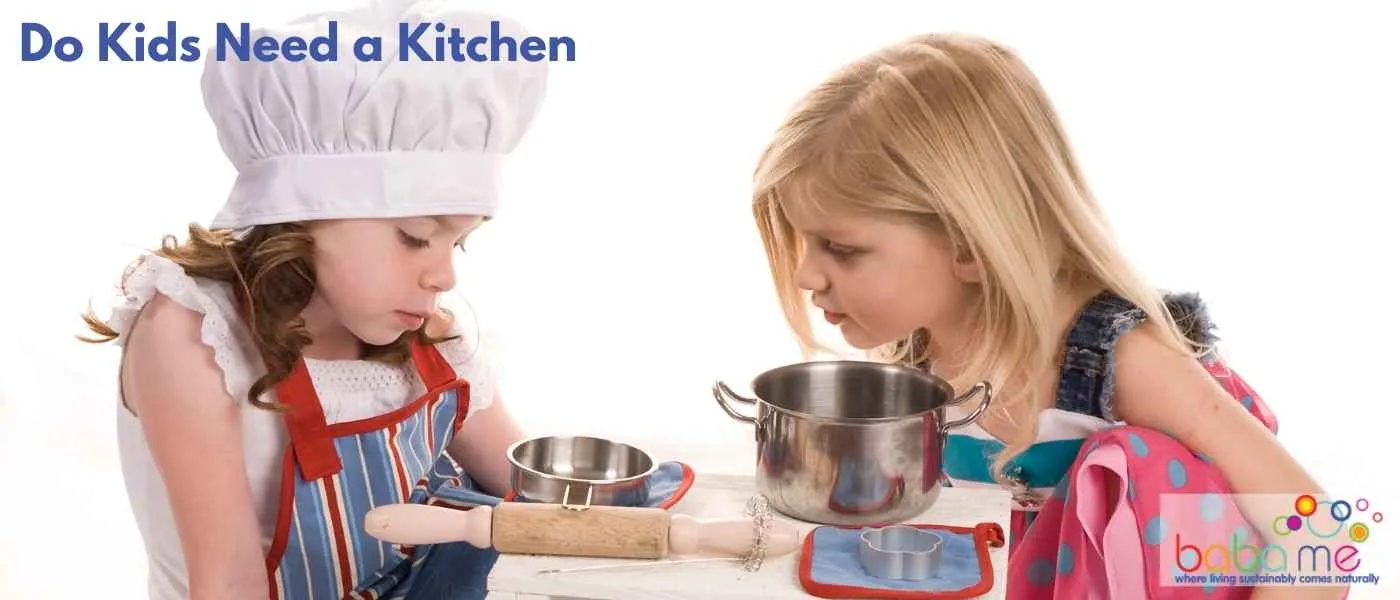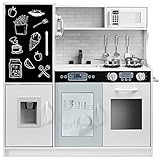Considering introducing a play kitchen to your child’s toy collection and pondering its potential benefits? You’re on the right track. Play kitchens, often dismissed as mere toys, are in fact powerful tools in a child’s developmental journey.
The value of play kitchens extends far beyond just pretend cooking; they serve as platforms for a multitude of learning experiences and skill-building activities.
Drawing from my expertise in child development and play-based learning, I’ve simmered down a comprehensive guide that delves into the reasons every child should have access to a play kitchen.
Let’s whip up a deeper understanding together, exploring how these miniature culinary corners can spice up creativity, social skills, cognitive development, and more in young minds.
Key Takeaways
Here are 15 reasons why every child should have a play kitchen:
- Imagination Boost: Play kitchens allow children to immerse themselves in pretend scenarios, letting their imagination run wild.
- Develops Motor Skills: From turning knobs to “cooking” with toy utensils, children enhance their fine motor skills.
- Promotes Independence: Kids learn to do tasks on their own, mimicking the independence they see in adults.
- Teaches Responsibility: Cleaning and organizing their kitchen teaches children about the importance of tidiness.
- Understanding Nutrition: Playtime can be an opportunity to discuss healthy food choices and balanced meals.
- Encourages Sharing: When playing with others, kids learn to share their kitchen space and “cooked” meals.
- Enhances Problem-Solving: Deciding what to “cook” or how to fix a “broken” appliance can improve problem-solving skills.
- Introduces Time Management: With multiple “dishes” to prepare, kids get a feel for juggling tasks and managing their time.
- Builds Self-Esteem: Completing tasks, like “cooking” a meal, gives children a sense of accomplishment.
- Improves Communication Skills: Children can enhance their language skills by discussing what they’re “cooking” and taking “orders” from playmates.
- Fosters Role-Playing: A play kitchen allows children to take on different roles, from a chef to a server, fostering empathy and understanding.
- Teaches Safety: While playing, parents can discuss the importance of kitchen safety, like staying away from “hot” surfaces.
- Promotes Real-Life Skills: Many skills learned in a play kitchen, like organization or following “recipes,” are useful in real life.
- Strengthens Social Bonds: Play kitchens can be a communal activity, allowing children to bond with friends and family.
- Educational Integration: Incorporating counting, reading “recipes,” or learning new food names, the play kitchen becomes a hub of educational activities.
Play kitchens and wooden play food are almost universally popular with children as they allow them to role-play and imitate situations they are familiar with. They can take on the role of head chef cooking up fabulous feasts, play at making dinner for the family, or open their own cafe.
This type of imaginative play isn’t just fun for kids, it’s also a great way for them to practise key skills and process new knowledge and experiences. Meaning a toy kitchen can be a great prop for child development.
There are a myriad of benefits your child can gain from playing with a toy kitchen, from enhancing cognitive ability and problem-solving skills to increasing their vocabulary and even making healthy food choices. Plus they are loads of fun.
What are the benefits of playing with kitchens and wooden play food
| Reason | Benefit Description |
|---|---|
| Imaginative Play | Play kitchens allow children to create scenarios, role-play, and immerse themselves in a world of imagination, fostering creativity. |
| Life Skills | Pretend cooking introduces children to basic life skills like cooking, cleaning, and organizing, which they’ll use in adulthood. |
| Cognitive Development | Following “recipes,” organizing “meals,” and problem-solving in play scenarios enhance cognitive functions. |
| Motor Skills | Activities like “cutting” vegetables, “stirring” pots, and handling mini utensils improve fine motor skills and hand-eye coordination. |
| Social Skills | Playing with others in a play kitchen fosters cooperation, turn-taking, communication, and negotiation. |
| Math & Literacy Skills | Measuring “ingredients,” counting items, and reading “recipes” integrate basic math and literacy concepts. |
| Emotional Development | Role-playing different scenarios can help children express and understand emotions, as well as develop empathy. |
| Independence & Confidence | Successfully “preparing a meal” or “hosting a tea party” can boost a child’s confidence and foster a sense of accomplishment. |
| Understanding the World | Children get a basic grasp of where food comes from, how meals are prepared, and the importance of nutrition and food safety. |
| Safe Exploration | A play kitchen offers a safe environment for children to explore cooking and kitchen activities without the risks of a real kitchen. |
| Bonding Time | Parents, siblings, or caregivers can join in the play, fostering bonding and shared experiences. |
Creative role play is a great way for kids to use their imaginations. Children can have loads of fun creating their perfect menus and exploring situations and relationships as they imagine scenarios and act them out.
Playing in this way can also help children develop their social skills, even if they aren’t playing with other children as they put themselves in someone else’s shoes and begin to imagine how that person is thinking and feeling, empathy. And lets them practise valuable life skills such as cutting, cleaning up and making healthy food choices.
When they do play together children learn about sharing, taking turns and develop their ability to work as a team. They have to talk to each other to decide who will take which role and how the story will play out.
Storytelling is also an important part of role-playing and a key in developing both narrative thoughts, vocabulary and language skills. With younger children especially a play kitchen well stocked with wooden play food allows you to talk about colours and numbers, the names of foods, actions such as cutting and mixing, opposites and other adjectives.
Playing is also the main way little ones develop everything from their ability to hold a pencil to their ability to solve complex problems. Simple actions like stirring, whisking and cutting are all great for fine motor skills and choosing which size pan, finding something else to use when they don’t have a plate. There are lots of developmental benefits for kids playing with play food.
So does your child need one?
When it comes to making a big purchase like a toy kitchen there are lots of things you might want to consider. Do you have space, do you have the budget, and is your child going to play with it.
If space is a problem there are lots of small kitchens you can buy including little tabletop kitchens that can be packed away when not in use.
If you’re not sure you can justify the cost or are worried that it won’t get played with you could always start off with some play food. Children will happily use the same plates they eat from to serve up their imaginary food, and you can lend them a couple of small pots and pans, a wooden spoon and a whisk from your own cupboards.







